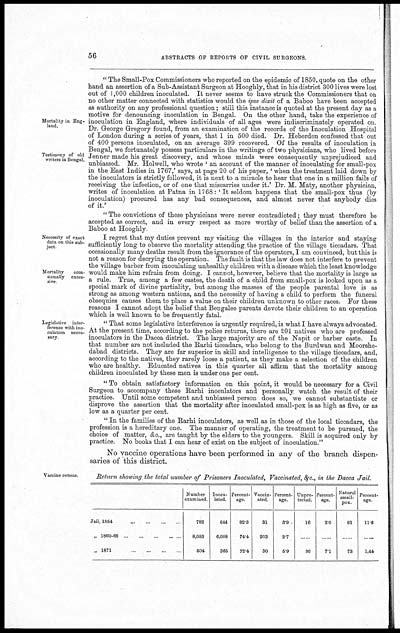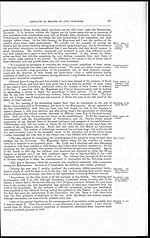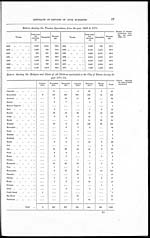Medicine - Vaccination > 1869-1873 - Report on vaccination in the Province of Bengal > Report on vaccination in the Province of Bengal for the year ending 31st March 1872
(303) Page 56
Download files
Individual page:
Thumbnail gallery: Grid view | List view

56 ABSTRACTS OF REPORTS OF CIVIL SURGEONS.
Mortality in Eng-
land.
Testimony of old
writers in Bengal.
" The Small-Pox Commissioners who reported on the epidemic of 1850, quote on the other
hand an assertion of a Sub-Assistant Surgeon at Hooghly, that in his district 300 lives were lost
out of 1,000 children inoculated. It never seems to have struck the Commissioners that on
no other matter connected with statistics would the ipse dixit of a Baboo have been accepted
as authority on any professional question; still this instance is quoted at the present day as a
motive for denouncing inoculation in Bengal. On the other hand, take the experience of
inoculation in England, where individuals of all ages were indiscriminately operated on.
Dr. George Gregory found, from an examination of the records of the Inoculation Hospital
of London during a series of years, that 1 in 500 died. Dr. Heberden confessed that out
of 400 persons inoculated, on an average 399 recovered. Of the results of inoculation in
Bengal, we fortunately possess particulars in the writings of two physicians, who lived before
Jenner made his great discovery, and whose minds were consequently unprejudiced and
unbiassed. Mr. Holwell, who wrote ' an account of the manner of inoculating for small-pox
in the East Indies in 1767,' says, at page 20 of his paper, ' when the treatment laid down by
the inoculators is strictly followed, it is next to a miracle to hear that one in a million fails of
receiving the infection, or of one that miscarries under it.' Dr. M. Maty, another physician,
writes of inoculation at Patna in 1768: 'It seldom happens that the small-pox thus (by
inoculation) procured has any bad consequences, and almost never that anybody dies
of it.'
" The convictions of these physicians were never contradicted; they must therefore be
accepted as correct, and in every respect as more worthy of belief than the assertion of a
Baboo at Hooghly
Necessity of exact
data on this sub-
ject
Mortality occa-
sionally exces-
sive
I regret that my duties prevent my visiting the villages in the interior and staying
sufficiently long to observe the mortality attending the practice of the village ticcadars. That
occasionally many deaths result from the ignorance of the operators, I am convinced, but this is
not a reason for decrying the operation. The fault is that the law does not interfere to prevent
the village barber from inoculating unhealthy children with a disease which the least knowledge
would make him refrain from doing. I cannot, however, believe that the mortality is large as
a rule. True, among a few castes, the death of a child from small-pox is looked upon as a
special mark of divine partiality, but among the masses of the people parental love is as
strong as among western nations, and the necessity of having a child to perform the funeral
obsequies causes them to place a value on their children unknown to other races. For these
reasons I cannot adopt the belief that Bengalee parents devote their children to an operation
which is well known to be frequently fatal.
Legislative inter-
ference with ino-
culation neces-
sary
" That some legislative interference is urgently required, is what I have always advocated.
At the present time, according to the police returns, there are 201 natives who are professed
inoculators in the Dacca district. The large majority are of the Napit or barber caste. In
that number are not included the Rarhi ticcadars, who belong to the Burdwan and Moorshe-
dabad districts. They are far superior in skill and intelligence to the village ticcadars, and,
according to the natives, they rarely loose a patient, as they make a selection of the children
who are healthy. Educated natives in this quarter all affirm that the mortality among
children inoculated by these men is under one per cent.
" To obtain satisfactory information on this point, it would be necessary for a Civil
Surgeon to accompany these Rarhi inoculators and personally watch the result of their
practice. Until some competent and unbiassed person does so, we cannot substantiate or
disprove the assertion that the mortality after inoculated small-pox is as high as five, or as
low as a quarter per cent.
" In the families of the Rarhi inoculators, as well as in those of the local ticcadars, the
profession is a hereditary one. The manner of operating, the treatment to be pursued, the
choice of matter, &c, are taught by the elders to the youngers. Skill is acquired only by
practice. No books that I can hear of exist on the subject of inoculation."
No vaccine operations have been performed, in any of the branch dispen-
saries of this district.
Vaccine census.
Return showing the total number of Prisoners Inoculated, Vaccinated, &c., in the Dacca Jail.
|
Number |
Inocu- |
Percent- |
Vaccin- |
Percent- |
Unpro- |
Percent- |
Natural |
Percent- |
|
|
Jail, 1864 ... ... ... |
782 |
644 |
82.3 |
31 |
3.9 |
16 |
2.0 |
91 |
11.6 |
|
„ 1860-68 ... ... ... ... |
8,083 |
6,058 |
74.4 |
203 |
2.7 |
...... |
...... |
...... |
...... |
|
„ 1871 ... ... ... ... |
504 |
365 |
72.4 |
30 |
5.9 |
36 |
7.1 |
73 |
1,44 |
Set display mode to: Large image | Zoom image | Transcription
Images and transcriptions on this page, including medium image downloads, may be used under the Creative Commons Attribution 4.0 International Licence unless otherwise stated. ![]()
| India Papers > Medicine - Vaccination > Report on vaccination in the Province of Bengal > Report on vaccination in the Province of Bengal for the year ending 31st March 1872 > (303) Page 56 |
|---|
| Permanent URL | https://digital.nls.uk/91535532 |
|---|
| Additional NLS resources: | |
|---|---|




